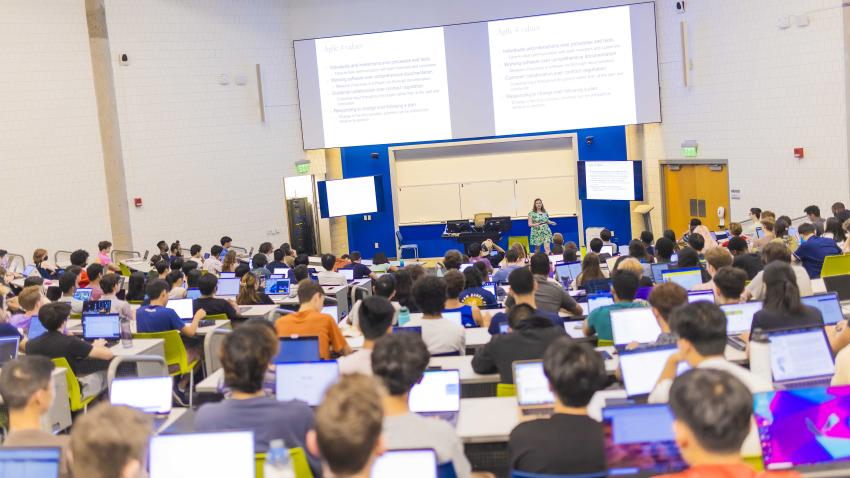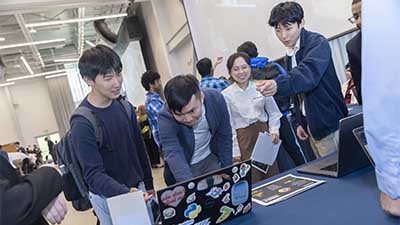
First-year Students Focus on Professional Identity and Networking Skills
The School of Computing Instruction (SCI) is laying a strong foundation for first-year students with the CS1100 Freshman Leap Seminar. Led by SCI Lecturers Kristine Nagel and Ronnie Howard, the course equips students with the skills and mindset needed to excel in computer science (CS) by connecting them with campus resources and industry experts.
A New Focus on Professional Identity and Networking
One of the course’s central goals is to help students develop a strong professional identity early in their academic careers.
“We want students to start seeing themselves as computing professionals, not just students,” Nagel said. “This means understanding the responsibilities that come with that identity and making wise decisions that will shape their future careers.”
To achieve this, the course places a significant emphasis on networking. Students will engage in activities such as attending career fairs, “meet-the-company” events, and workshops with the College of Computing Career Center.
[RELATED: New Initiatives Shape the Future of Career Services in Computing]
They will also attend the CS Capstone Expo, where third- and fourth-year (CS) and computational media (CM) students showcase their software design projects. This exposure will provide first-year students a sense of direction and a glimpse at future opportunities.

Engaging with Campus and Corporate Partners
In addition to networking and professional development, students will be introduced to key campus resources such as Wellness Empowerment Center programs, which are integral to their overall well-being and success at Georgia Tech.
Additionally, the College’s international studies program provides insight into CS-led study abroad programs and other opportunities to broaden perspectives.
“We’re going to get students familiar with Georgia Tech and SCI, but we also hope to get them familiar with other departments within the College of Computing,” Howard said.
Guest speakers from various departments and corporate partners will play a crucial role in acclimating students to campus life and the industry. Students are encouraged to engage actively and take notes during interactive sessions, which will help them form meaningful connections.
“We want them to see the relevance of what they’re learning and how it applies to their future careers,” Nagel said.
Getting to Know Faculty
Integrating higher-level faculty into the CS1100 course is another way to connect students with the broader scope of their academic journeys.
SCI has the breadth of the undergraduate program, teaching 1000-4000 level courses. Having faculty who teach higher-level courses engage with students in CS1100 closes what could be a significant gap.
“It’s a two-way benefit; students get to know their faculty in advance while faculty can engage with students and share things, curriculum-wise, they can look out for,” SCI Chair Olufisayo Omojokun said.
“Faculty can also give them windows into challenges they may see down the line and help them start connecting dots.”
Preparing for the Future
As the field of computing evolves, the jobs that today’s students will eventually hold may not even exist. Recognizing this, SCI has designed the CS1100 course to equip students with the skills and mindset needed to navigate an uncertain future.
“We’re guiding them to make decisions based on what they know and what they see inside themselves. It’s about living with uncertainty and being prepared for whatever comes next,” Nagel said.
The course’s focus on integrating soft skills and personal integrity with technical knowledge ensures students are well-equipped for their academic and professional careers.
By emphasizing professional identity, learning through role-playing, and real-world experiences, the CS1100 Freshman Leap Seminar prepares students for their academic journey and the evolving challenges in computing.
As computing revolutionizes research in science and engineering disciplines and drives industry innovation, Georgia Tech leads the way, ranking as a top-tier destination for undergraduate computer science (CS) education. Read more about the college's commitment:… https://t.co/9e5udNwuuD pic.twitter.com/MZ6KU9gpF3
— Georgia Tech Computing (@gtcomputing) September 24, 2024


